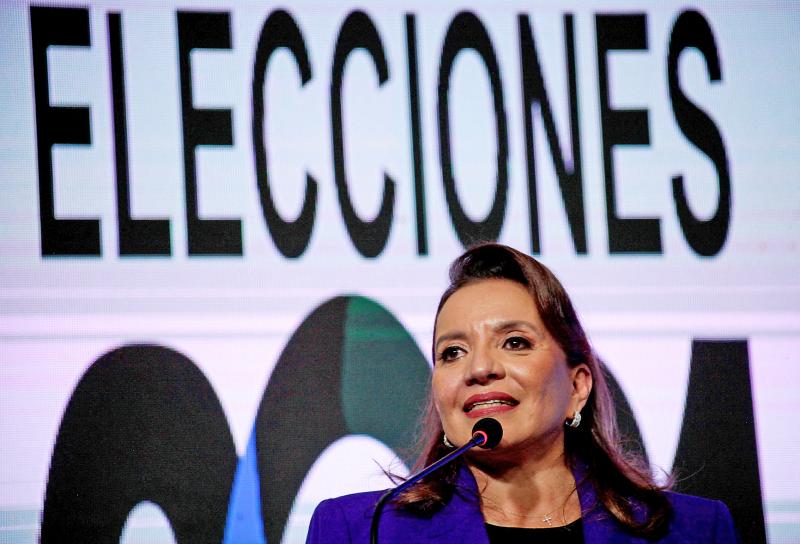Vice President William Lai (賴清德) is to serve as President Tsai Ing-wen’s (蔡英文) envoy at the inauguration of Honduran president-elect Xiomara Castro on Thursday next week, the Presidential Office said yesterday.
It would be the first time that Lai travels overseas since he took office in May 2020.
Presidential Office spokesman Xavier Chang (張惇涵) said that Lai is to lead a delegation of 26 people, who are to depart Taipei on Tuesday next week.

Photo: Reuters
The delegation would depart Tegucigalpa on Friday next week and arrive back in Taiwan on Sunday next week, Chang said.
The delegation would transit in a third country, he said, without specifying when or disclosing the location, although Chinese-language media reported that the delegation would stop in Los Angeles.
Among the delegation would be Representative to the US Hsiao Bi-khim (蕭美琴) and pandemic prevention experts, Chang said.
He did not say why Lai rather than Tsai herself is to attend the ceremony.
Asked about the stopover, Vice Minister of Foreign Affairs Alexander Yui (俞大㵢), who is responsible for Latin American affairs, refused to provide more details.
Arrangements are being made with authorities at the planned transit location and it would be made public soon, Yui said.
Lai might face issues if the stopover is in the US, because authorities there require visitors to be fully vaccinated against COVID-19 with an approved vaccine.
Lai was vaccinated with the Taiwan-made Medigen vaccine, which is not yet on the US’ list of accepted COVID-19 vaccines.
Asked about the situation, Yui would only say that Lai would fully cooperate with local COVID-19 prevention measures.
All members of the delegation would follow COVID-19 prevention protocols throughout the trip, such as undergoing tests for the virus before and after the visit, Chang said.
After returning to Taiwan, Lai and the others would quarantine for 14 days and follow self-health management protocols for another seven days, Chang said.
While in Honduras, Yui said that Lai is expected to interact with foreign dignitaries at the ceremony, including US Vice President Kamala Harris, who is to lead a US delegation.
Lai would meet with Castro to convey Tsai’s congratulations and discuss matters related to bilateral ties, Yui said.
Castro’s win in the Nov. 28 presidential election made her the first female president of the Central American country, which first established diplomatic ties with Taiwan more than 80 years ago.
The victory of the 62-year-old wife of ousted former Honduran president Jose Manuel Zelaya had previously raised concerns about Honduran ties with Taiwan, as she said during her campaign that she might switch recognition to China if she won.
However, two senior members of Castro’s transition team last month said that the incoming government would maintain diplomatic ties with Taipei.
Also last month, Minister of Foreign Affairs Joseph Wu (吳釗燮) said Castro’s team had promised that Honduras’ diplomatic ties with Taiwan would remain unchanged.

CHAOS: Iranians took to the streets playing celebratory music after reports of Khamenei’s death on Saturday, while mourners also gathered in Tehran yesterday Iranian Supreme Leader Ayatollah Ali Khamenei was killed in a major attack on Iran launched by Israel and the US, throwing the future of the Islamic republic into doubt and raising the risk of regional instability. Iranian state television and the state-run IRNA news agency announced the 86-year-old’s death early yesterday. US President Donald Trump said it gave Iranians their “greatest chance” to “take back” their country. The announcements came after a joint US and Israeli aerial bombardment that targeted Iranian military and governmental sites. Trump said the “heavy and pinpoint bombing” would continue through the week or as long

TRUST: The KMT said it respected the US’ timing and considerations, and hoped it would continue to honor its commitments to helping Taiwan bolster its defenses and deterrence US President Donald Trump is delaying a multibillion-dollar arms sale to Taiwan to ensure his visit to Beijing is successful, a New York Times report said. The weapons sales package has stalled in the US Department of State, the report said, citing US officials it did not identify. The White House has told agencies not to push forward ahead of Trump’s meeting with Chinese President Xi Jinping (習近平), it said. The two last month held a phone call to discuss trade and geopolitical flashpoints ahead of the summit. Xi raised the Taiwan issue and urged the US to handle arms sales to

BIG SPENDERS: Foreign investors bought the most Taiwan equities since 2005, signaling confidence that an AI boom would continue to benefit chipmakers Taiwan Semiconductor Manufacturing Co’s (TSMC, 台積電) market capitalization swelled to US$2 trillion for the first time following a 4.25 percent rally in its American depositary receipts (ADR) overnight, putting the world’s biggest contract chipmaker sixth on the list of the world’s biggest companies by market capitalization, just behind Amazon.com Inc. The site CompaniesMarketcap.com ranked TSMC ahead of Saudi Aramco and Meta Platforms Inc. The Taiwanese company’s ADRs on Tuesday surged to US$385.75 on the New York Stock Exchange, as strong demand for artificial intelligence (AI) applications led to chip supply constraints and boost revenue growth to record-breaking levels. Each TSMC ADR represents

Pro-democracy media tycoon Jimmy Lai’s (黎智英) fraud conviction and prison sentence were yesterday overturned by a Hong Kong court, in a surprise legal decision that comes soon after Lai was jailed for 20 years on a separate national security charge. Judges Jeremy Poon (潘兆初), Anthea Pang (彭寶琴) and Derek Pang (彭偉昌) said in the judgement that they allowed the appeal from Lai, and another defendant in the case, to proceed, as a lower court judge had “erred.” “The Court of Appeal gave them leave to appeal against their conviction, allowed their appeals, quashed the convictions and set aside the sentences,” the judges